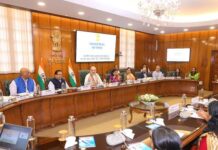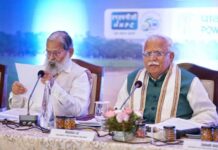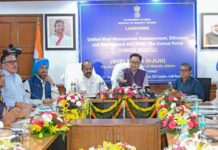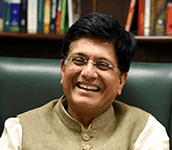JUNE 06: Union Minister for Power and Housing & Urban Affairs, Shri Manohar Lal, chaired a high-level Regional Power Conference for Northern States and Union Territories in Chandigarh. The meet brought together top ministers and officials from states like Haryana, Punjab, Uttar Pradesh, Uttarakhand, Rajasthan, Delhi, and Jammu & Kashmir, along with central power authorities.
During the conference, the Minister highlighted a key national milestone—India’s successful handling of a record 250 GW peak power demand in May 2024, marking the nation’s shift from a power-deficit to a power-sufficient economy.
Looking ahead, Shri Manohar Lal urged states to plan proactively as India’s peak demand is projected to touch 446 GW by FY2034–35. He emphasized the need for a balanced energy mix, recommending that states also invest in nuclear energy alongside renewable sources to meet future needs sustainably.
The Minister encouraged all states to resolve pending intra-state transmission infrastructure issues and utilize the ₹1.5 lakh crore allocated as interest-free loans in the Union Budget 2025–26 to boost capital expenditure. He also underlined the importance of meeting Renewable Purchase Obligations (RPOs) and forming dedicated teams for renewable energy planning.
Reinforcing the need for efficiency and transparency, Shri Manohar Lal directed states to complete installation of prepaid smart meters in government buildings and colonies by August 2025, and for all commercial, industrial, and high-load consumers by November 2025. He stressed the transformative role of AI/ML-based data analytics in improving consumer experience and reducing power losses.
On financial health of distribution utilities, he urged states to clear pending dues, ensure cost-reflective tariffs, and reduce AT&C losses. He added that states must explore listing utilities to raise resources and improve governance.
Cybersecurity and power islanding schemes were highlighted as essential to ensuring grid stability in a digital age.
The conference reaffirmed Centre-State collaboration as vital for realizing ‘Power for All, at All Times’ and progressing toward Viksit Bharat by 2047 through a resilient, modern, and inclusive power sector.




















